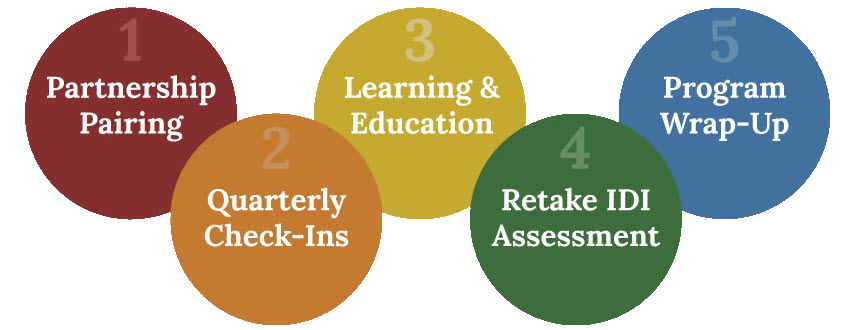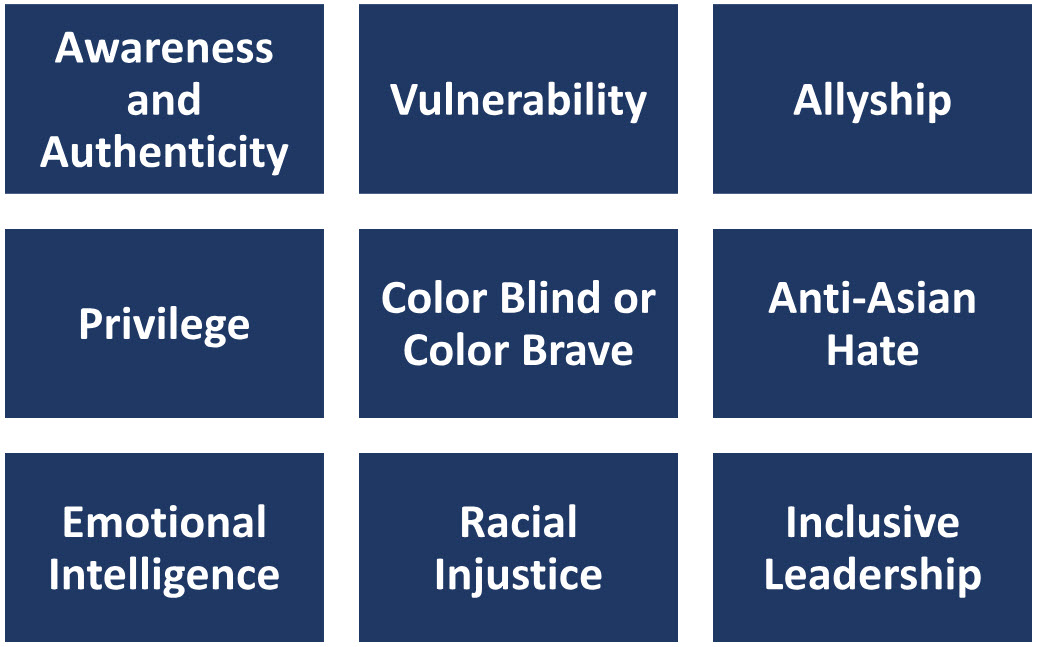Cross-Cultural Learning Program (CCLP)
Reciprocal Mentoring Partnerships
Program Description
Program Objectives
The Cross-Cultural Learning Program explores how culture can affect business and workplace relationships and how leveraging the myriad of differences in the workplace can increase our commitment to creating an inclusive workplace. The program also explores the variety of ways one may perceive a situation from the lens of that individual, from a cultural perspective and a leadership perspective.
Each dialogue session should be scheduled for 1-hour in length and requires both partners to complete the pre-work; watch, read, or listen to some form of information. There are reflection questions provided by SDS Global to fill out prior to any dialogue, and suggested conversation starters. Each of the lessons will have a purpose, theme, activity steps, and dialogue questions.
Reciprocal mentoring is a relationship structure that harnesses the power of mentoring into a mutually beneficial relationship where each participant takes turns being the mentor and the mentee. Since much of the power of mentoring lies in the accountability and encouragement, both participants can be trained to be in both roles.
- Gain a deeper knowledge for cultural differences and personal struggles on specific diversity topics.
- Create a common set of shared values that can be used for working more effectively across cultures.
- Close the gap in the participant’s developmental orientation as identified in the IDI.

Progam Prerequisites
- Each participant must have taken the Intercultural Development Inventory (IDI) Assessment and have had their 1-1 debrief by an SDS Global Enterprises IDI Administrator on their individual results.
Format of Quarterly Check-Ins
- Virtual
Timeframe
12-month commitment
Each of the lessons are customized based on the defined audience, allowing the participants to read/watch, reflect, and journal any thoughts prior to meetings via in-person or conference call. Lessons are delivered by SDS Global once per quarter in 3 lesson increments to the client. The client should disseminate the assignments to the partners on a monthly basis.
NOTE: This type of mentoring is more loosely defined and based on a structure or process. This offers full teaching and learning potential to happen via the partnership and the level of shareability of cross- cultural information.
Cross-Cultural Learning Program Cycle

1. Partnership Pairing
Participants are paired with a colleague who is culturally different from them in some significant way, such as gender, race, ethnicity, age, tenure, experience, location, personality styles, etc. Final pairings will be determined with consultation from SDS Global and by the client’s project team. Each participant must agree to work together for a designated time, in a process of “reciprocal mentoring” meaning both parties teach and learn from each other. Participants are asked to approach the learning with an open mind to learning and for their thinking to be challenged. Participants are expected to maintain the highest of professionalism and confidentiality.
2. Quarterly Check-Ins
After every 3 months of activities and individual group discussions have been performed, the entire CCLP Group of Participants will virtually meet for a 1-hour virtual discussion with SDS Global Enterprises, Inc. to discuss partnership feedback, findings, and to recap the 3 assigned lessons.
3. Learning and Education
At the end of the 12 assignments, we will facilitate provide learning based on the identified gaps from the check-in sessions. This learning will enable the participants to take a deeper dive into issues and topics where they need additional skill building, awareness building and implementation. As an important part of this phase, participants will be able practice real-world, work life scenarios where they will be able to practice the skills necessary to address the gaps identified in the program.
4. Retake the Intercultural Development Inventory (IDI) Assessment
At the end of the 12 assignments, we will facilitate provide learning based on the identified gaps from the check-in sessions. This learning will enable the participants to take a deeper dive into issues and topics where they need additional skill building, awareness building and implementation. As an important part of this phase, participants will be able practice real-world, work life scenarios where they will be able to practice the skills necessary to address the gaps identified in the program.
5. Program Wrap-Up
At the end of the 12 assignments, we will facilitate provide learning based on the identified gaps from the check-in sessions. This learning will enable the participants to take a deeper dive into issues and topics where they need additional skill building, awareness building and implementation. As an important part of this phase, participants will be able practice real-world, work life scenarios where they will be able to practice the skills necessary to address the gaps identified in the program.
Sample Assignment Topics
At the end of the 12 assignments, we will facilitate provide learning based on the identified gaps from the check-in sessions. This learning will enable the participants to take a deeper dive into issues and topics where they need additional skill building, awareness building and implementation. As an important part of this phase, participants will be able practice real-world, work life scenarios where they will be able to practice the skills necessary to address the gaps identified in the program.

